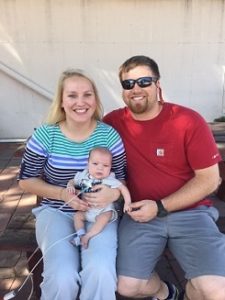Imagine a newborn baby in a hospital emergency room. Or a loved one who is elderly, frail and in pain. ERs are very unsafe places for vulnerable patients. The frail elderly, the very young and all the very sick people in between need the support and protection of a family member in the hospital. We are the essential conduits between patient and health care professionals. We cocoon our loved ones from the germs of others' illnesses in the hospital the best we can. And we do this while giving personal care. We divert our loved ones' attention away from their pain and suffering. We ensure that their preferences are expressed in the positioning of the waste basket and the blankets. And we wonder in solidarity with them about what will happen next.
And the centrality of the family caregiver role in hospital increases with the complexity of the chronic care patient's needs. The Alzheimer's patient who also has diabetes along with challenging behaviour cannot be managed on a regular ward without a vigilant son or daughter by the bedside to help keep things under control. Nurses and doctors who trust the knowledge and capacities of 'frequent flyer' parents of medically complex children expect those parents to give their child 24 hour skilled care while in hospital. Some parents describe 'family centred care' as 'parents, do it yourself care'.
Frequently, patients are discharged home with new devices or complex treatment plans. Families must step up and learn nursing skills at a time that is acutely stressful. Already exhausted, family members must take on new information and new responsibilities on discharge, often with very little support.

None of this is the fault of the highly trained and compassionate staff in hospitals. It's simply an uncomfortable stage in the evolution of contemporary healthcare - caught somewhere between the old model of paternalistic medicine and the contemporary reality of cutbacks, sicker people and an aging population.
Family caregivers WANT to help look after their loved ones. But we need to be recognized as essential components of the treatment team and we need the ability to set limits on the number of hours we put in at the bedside. Just because family care is borne of love and is unpaid, it shouldn't be deemed arbitrary, frivolous or a luxury. Family care is essential in hospitals, so let's start talking about it that way.
4 comments:
I agree that family caregivers should be viewed as essential in a hospital environment. In fact I believe that just plain family members who care are essential. A hospital can seem to be a cold and lonely place for many. Just having loved ones involved can be a big help in recovery.
I 100% agree with you that family is essential for health and care. In my opinion, health should be the most important thing in the mind of every family.
Life only comes once, and if we want to live a happy, healthier life, good health is essential.
Right from the first day, we need to guide our kids about the importance of perfect health.
Usually, teenagers do not know about the effects of eating right and unhealthy food. Therefore, it is the responsibility of their family to guide them, so they don't need to visit hospitals.
For example, if you are drinking milk daily, it will improve.
Teeth health
Bones health
Muscle Growth
Heartburn
Milk is also a disease fighter
Further, I was reading a couple of months ago about the miracle tree known as Moringa. Moringa oleifera is a natural plant which has loads of health benefits. If you are using the best moringa powder daily it will improve:
Bones health
Mental health
Stomach health
Liver health
Eye health
Skin-related issue
Diabetes
High cholesterol level
Joints inflammation
Cancer
So, it's essential to make sure that you and your family are using organic food regularly so that you can avoid dangerous diseases naturally.
Further, I agree that every person in a family should learn how to take care of their loved ones in hospitals.
Seniors are the demographic in greatest need of in-home care. Thanks for your plan!
https://threelinks.org/senior-living/
Caregivers are distinctly different from nurses from the hospital or from the home for the elderly. The care they give our family members are genuine and unparalleled. Despite the professional help we get from health care workers in hospitals, caregivers give us a more connected kind of care. It's best that we also care for our caregivers and consider them as an extension of our family. One way I'm able to do this is by giving our caregiver her own set of everyday supplements.
Post a Comment